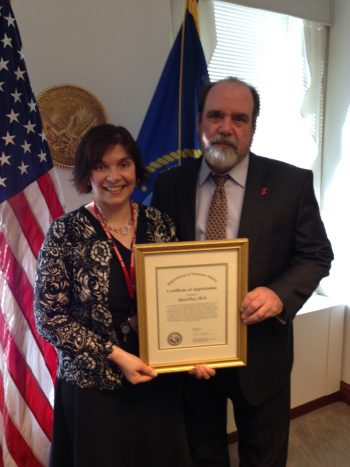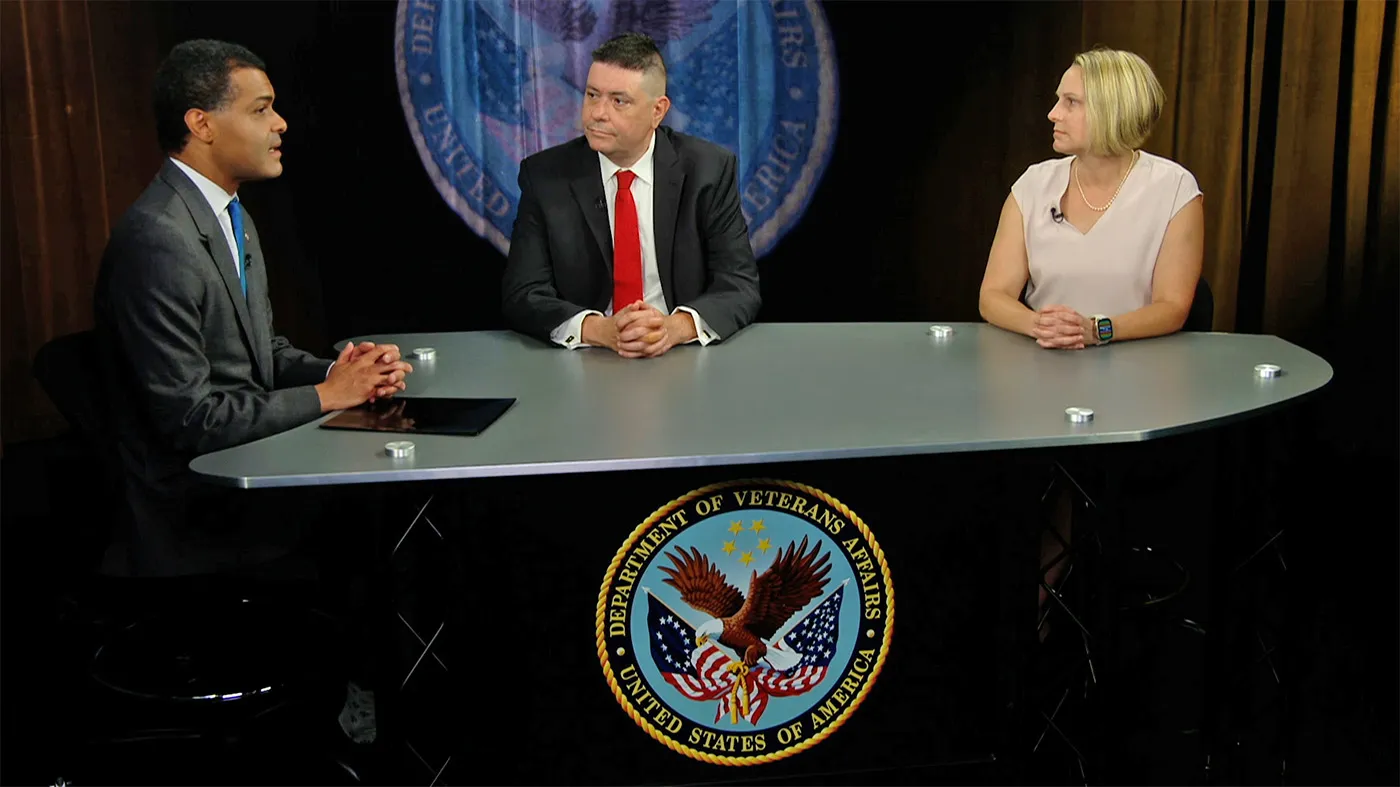A new VA initiative is changing how the department informs its employees, patients and their families, and the media about what are called large-scale adverse events.
Such events potentially expose thousands of hospital patients worldwide each year to unsafe clinical practices that stem from systemic and preventable errors. These events can injure many patients or increase their risk of injury but are not detected by the health care system when they occur.
Dr. A. Rani Elwy, a health psychologist and health services researcher at the VA Bedford Healthcare System in Massachusetts, is spearheading the new VA program. It provides verbal and written communication expertise to VA facilities needing to disclose information about heath care to patients, families, employees, and the public.

Dr. Robert Jesse, a former VA principal deputy undersecretary for health, presents Rani Elwy with a certificate of appreciation in 2014 for the work she and her team did to improve how VA responds to adverse events.
This information is in a toolkit that Elwy and her colleagues developed through a VA-funded five-party study that focused on proven communication responses to large-scale adverse events. The toolkit is aligned with a 2018 VA directive – the most up-to-date one of its kind in VA – that establishes a policy ensuring consistency in how VA discloses details about adverse events in clinical care.
Disclosure is `complex and requires quick execution’
In the study, Elwy and her team interviewed leaders, employees, patients and family members at nine VA facilities where large-scale adverse events were disclosed to identify key lessons learned. When reflecting on past events, many leaders and employees felt that they needed resources to help with the communication process. The toolkit, which notes that large-scale adverse event disclosure is “complex and requires quick execution,” was created to help address that need.
Among the messages Elwy and her team gleaned from the research is that it’s unhelpful to Veterans to downplay the risk of an adverse event, and that a health care worker must tell them about the event verbally, not through the mail. When a letter arrives about an adverse event, Veterans may want to talk to a health care worker immediately, Elwy says, noting that they also may not know what to do with the information.
`But you never know’
“Very, very few if any of these Veterans have ever contracted HIV or hepatitis C or hepatitis B as a result of something like this,” she says. “But you never know. So one of the messages is that it would be good for them to come back in and get a blood test just to make sure they’re okay. But anytime you say the word HIV or hepatitis to a Veteran, that’s very scary. It’s better to hear that over the phone so they can ask questions. Then you can say, `We really don’t want to leave anything uncovered. Can you please come back in and have a test?’ As opposed to putting it into words in a letter when they have no one to talk to and may think, `Oh my God, I have HIV.’
“In our toolkit,” she adds, “we try to make sure the language is straightforward, that we’re not trying to say to someone, `Look, you’ll be fine. But we’re just telling you this because we want to tell you.’ We’re trying to avoid any downplaying because it’s unhelpful for decision-making moving forward. It doesn’t help Veterans with what to do next.”
More information
Click here to read the full story.
Click here to learn more about VA research.
Topics in this story
More Stories
Diverse representation of women in health care research allows MVP to make discoveries for women’s health
Join the Million Veteran Program online. You will have the option to receive an at-home blood sample collection kit in the mail.
VHA's new podcast series, New Horizons in Health, features a candid discussion of psychedelic assisted therapies for Veterans experiencing mental health conditions.







why are code red physician incident reports and attendant transfer reports kept secret… this happen in 2010… respiratory failure while being transferred from ER to a ward upstairs.
Perhaps a service officer at the American Legion or DAV can help you appeal that for higher rating. Sad about your experience.
The VA will and can fully serve the veterans needs 100% when they fire all of the politicians who set the rules for the VA, throw out all of the rules and start over with one rule: To fully serve the needs of every veteran no matter what they are and do it within 90 days of applying for those needs. Further, all veterans needing healthcare have the right to go to any doctor or hospital within the U.S. and be covered 100% for whatever is needed. Why does the VA have to have a special system to communicate with vets? Either pickup the phone and call or use email and do it immediately. We do not need a specialized system for communications. The whole VA thing is set up to discourage, interfere, refuse, ignore the needs of veterans. Any and all vets should get full healthcare including dental and eyes and ears whenever they need it with no exceptions, period.
I had prostrate surgery and the doctor left a stitch out and I bleed into my stomach. The doctor did surgery again almost died now I wear a diaper because I leak all the time .His name was Dr Porter and what bugs me they only gave me 10persent
Perhaps a service officer at the American Legion or DAV can help you appeal that for higher rating. Sad about your experience.
The VA has outlived it’s usefulness and needs to close. Women are treated like trash by the VA. Labeled lazy hypochondriacs that just need to exercise. Why are women excluded from President Lincolns promise made in 1865?
On September 12, 2020 I was diagnosed with Lymphoma of the brain. I have called hundreds of times for help, but to no avail. Now, Hospice has shown up to my house to treat me out of life. I am not allowed further doctor visits, or Hospice will stop providing me pain meds. This is is exactly how my brother was treated 20 years ago. There is no accountability at the VA for these awful doctors,you should all be ashamed of yourselves.
Is the purpose of this blog to give the Veterans an opportunity to share adverse events that occurred while receiving “care” (?) at a VA facility?
Is the purpose of this blog to give the Veterans an opportunity to share adverse events that occurred while receiving “care” (?) at a VA facility?
Yup, more lies. Getting deep, better put my , ahem.., boots on.
Naples Fl. VA clinic still has not received vaccines to cover veterans I am 86 years old Why are we being past over?
Edward Lester